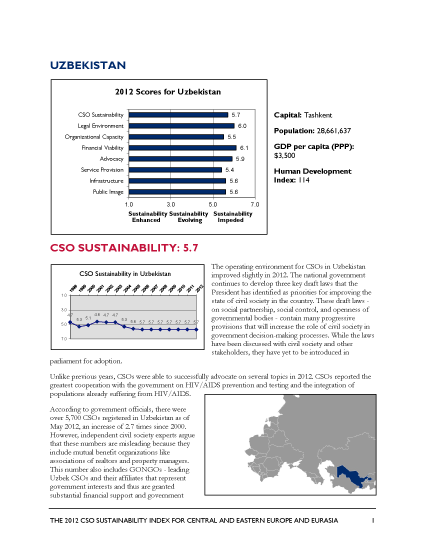CSO SUSTAINABILITY: 5.7
The operating environment for CSOs in Uzbekistan improved slightly in 2012. The national government continues to develop three key draft laws that the President has identified as priorities for improving the state of civil society in the country. These draft laws - on social partnership, social control, and openness of governmental bodies - contain many progressive provisions that will increase the role of civil society in government decision-making processes. While the laws have been discussed with civil society and other stakeholders, they have yet to be introduced in parliament for adoption.
Unlike previous years, CSOs were able to successfully advocate on several topics in 2012. CSOs reported the greatest cooperation with the government on HIV/AIDS prevention and testing and the integration of populations already suffering from HIV/AIDS.
According to government officials, there were over 5,700 CSOs registered in Uzbekistan as of May 2012, an increase of 2.7 times since 2000. However, independent civil society experts argue that these numbers are misleading because they include mutual benefit organizations like associations of realtors and property managers. This number also includes GONGOs - leading Uzbek CSOs and their affiliates that represent government interests and thus are granted substantial financial support and government endorsement of their activities - including Kamolot Public Youth Movement, Uzbekistan’s Women Committee, Independent Institute to Monitor the Formation of Civil Society (NIMFOGO), Makhalla Fund, and the National Association of Non-governmental Non-commercial Organizations (NANNOUz). The number of operational CSOs is unknown.








Comment
Make a general inquiry or suggest an improvement.